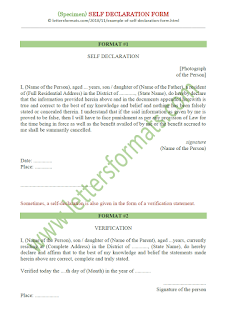
A self-declaration is a statement made by a person declaring that all the statements of facts, figures and circumstances mentioned in a document is true and correct. Unlike an affidavit, a self-declaration does not necessarily require it to be notarized and witnessed, but one may do it if needed.

In simple words, a self-declaration is a method of double check wherein the person, swears that he has gone through all the statements made in a document by him and none of them are false. Such self-declaration helps the legal authority, who is verifying the said document, to understand and take a decision based on such statements.
A self-declaration can be made at the bottom of the ending part of the main document for which such a declaration is made or else it can be made as a separate document with reference to the main document.
Here are examples of such self-declarations. It can be descriptive depending upon the case. Affixing the photograph of the person, who is making the declaration, is not mandatory unless it is so required.